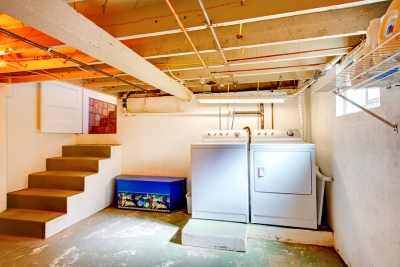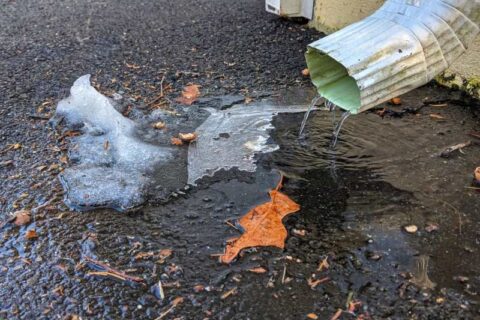The Importance of Basement Inspections
 Whether you’re buying a home, selling a home, or just want to make sure your home is in good condition, a home inspection is an invaluable tool. Certified home inspectors are trained to find issues you might not have caught in time to prevent some very expensive repairs. From faulty wiring to defective heating to poor ventilation to troubles with the roof, home inspectors identify problems from the top to the bottom of a home. During this process, the basement inspection is perhaps the most important inspection of all.
Whether you’re buying a home, selling a home, or just want to make sure your home is in good condition, a home inspection is an invaluable tool. Certified home inspectors are trained to find issues you might not have caught in time to prevent some very expensive repairs. From faulty wiring to defective heating to poor ventilation to troubles with the roof, home inspectors identify problems from the top to the bottom of a home. During this process, the basement inspection is perhaps the most important inspection of all.
Why is the basement such an important room to inspect? It’s because some of the worst issues that you find in a house, like mold and foundation problems, show themselves in the basement. What’s more, an issue in the basement can be a symptom of an issue with a different part of the home. For example, if there’s moisture in the basement, it could be a symptom of poor grading or drainage, defective gutters, plumbing issues, or window wells that were not properly installed. While a homeowner might see some staining or blistering of the wall coverings, or smell a musty odor and take some steps to treat those symptoms, a home inspector will know how to find the root of the issue, in order to offer a permanent solution to the underlying problem.
What problems is the inspector likely to find in the basement?
- Foundation issues: Cracks in the basement walls or floors can indicate a problem with the foundation, as can bowed walls. Sometimes, even a leak is a symptom of foundation trouble.
- Vermin: An inspector will know how to find the signs of mice, rats, or termites infesting your home. Mice and rats, and other creatures are easily trapped, but termites, drawn to your home by moisture in your walls, will tear down the whole structure if they’re not eliminated. Catching termites early is the best way to prevent them from doing irreparable damage to the house.
- Mold: Mold is never a good thing, and it’s always caused by excessive moisture. Whether it’s black, white, or green, the inspector can find it and advise you on mold remediation.
- Leaks: Water can come into your basement through windows, cracks, pinholes, and other places; in fact, water can enter the basement from a leak in the roof. These problems are particularly common in older homes but can occur in any age of home. If there’s standing water in the basement, that’s an obvious red flag, but there are other signs of leaks as well. It could be as simple as a water stain or condensation, but if there’s moisture in the basement, it’s a sign that there’s a deeper issue that needs addressing.
Of course, you probably won’t want to call out a basement inspector every year, so that means you need to go check it out on your own. At least once a year, take a good look at your basement, checking for cracks or signs of water damage on the walls or floor. If you do notice a small crack, start checking it every couple of months to make sure it’s not expanding. For a major crack or a water leak, call in an expert to repair it. Every time it rains, give your basement a once-over, looking for damp spots, particularly in the corners, or a musty smell that may indicate a mold or mildew problem. Keep up with your sump pump, too, checking it every six months to make sure it’s still in good working order. Look around for mold, or any signs of rodents, and if there’s something you are not sure is a problem, call in an inspector to give it a closer look. Whether you find the problem yourself or the inspector spies it, it’s vital that you take the next step and call in a professional to remedy the situation.
If you’ve noticed a common thread in all of these issues, you’ll realize that water is to blame for many of the problems facing a basement. How do you keep water out of a basement? Start with the easiest and most cost-effective solution, working your way up from there, in a logical way that goes from least to most costly, easiest to most difficult.
First, remove any obvious source of moisture from the basement, and do not ventilate with outdoor air in the summer. Maybe there’s a humidifier, or someone has been cooking, or you can see where the water came into the basement. Fix the problem, and then ventilate, using the air conditioner or a desiccant-type heat exchanger. You can also use a dehumidifier to reduce the dampness and odor in the basement, but it’s not a permanent solution. In fact, a dehumidifier used in a damp basement can dry out the air and cause moisture to be drawn into the basement rapidly and settle in the walls.
Once you’ve done that, look for the source of the problem, evaluating gutters, downspouts, and surface grading, to see if you can determine where the water is coming in. If you find an easily solvable issue, you may be able to correct it and remedy your basement’s water problem. If this doesn’t fix your moisture problem, though, it may be time to call in a professional. Just as an inspector can point to the problems in your home, and expert basement waterproofing technician can look at your home and offer solutions.
No matter what issues may come up during your basement inspection, you can trust Budget Waterproofing to be there for all your basement related needs. We’ve got more than 55 years of experience servicing both commercial and residential customers throughout Maryland. We’re proud of our craftsmanship and confident in our skills, and all of our technicians are fully licensed, insured, and bonded. Whether your problem is moisture, humidity, or mold in your basement, we have the experience and know-how to provide the solution. For more information, contact us today.


